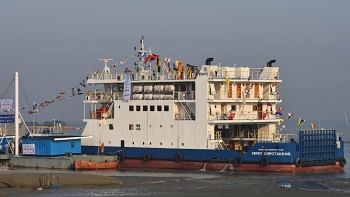Sorry Mr. Ibrahim Khaled!
Courtesy Bangla-desh Economic Association, I know Mr. Ibrahim Khaled since 1982. He studied in Dhaka University's science faculty and then completed his MBA from Institute of Business Administration. Apart from creating excellence in commercial banking, he did a very good job even at the central bank as its deputy governor. Before that, he worked in Agrani Bank, Sonali Bank, Bangladesh Krishi Bank and Palli Karma Shayahak Foundation. Besides, he was the president of Bangladesh MBA Association and was also engaged with many socially active organisations.
He played a significant role in reorganising the erstwhile almost sick Pubali Bank Ltd. Throughout his career, he was very firm in his conviction and committed to the causes of people. He was extremely strong against trade unionism in the state owned banks and even put his foot down for bringing in discipline in those banks. He was always loud and clear for democratic causes, chain of command and maintained uncontroversial ethical standards.
He retired from Pubali Bank and decided to dedicate his rest of the life to the cause of children and juveniles as the "Dada Bhai," or director, of Kachi Kachar Mela, the oldest juvenile organisation in the country. Despite a few people having some uneasy feelings about his being too blunt about democratic standards, he was posted as the chairman of Bangladesh Krishi Bank.
Readers might feel I have written a testimonial for Mr. Khaled. Not really, I am rather writing a sorry note for him for what is happening around him lately. In view of the massive debacle in the country's bourses, the government looked for a "strong person" to enquire into the causes of the stock market crash and come up with some appropriate policy recommendations, and he was chosen.
The time given was two months and he was given two colleagues to help him initially--Dr. Taufiq Ahmed Chowdhury, Director General of BIBM, and Mr. Abdul Bari, a partner in leading accounting firm, (also former president of Institute of Chartered Accountants, Bangladesh). Later, the country's noted legal counsel and a knowledgeable person in capital market issues--Nihad Kabir joined the team.
Those of us who always thought that whatever was happening in our bourses, and especially in the regulatory body, was mainly a moral issue, welcomed the move and were confident that the team would do a good job. The team consulted almost all stakeholders possible within the stipulated time and submitted the report in time. Though the report could have been little more extensive, the team did a respectable job with regard to finding the possible causes of the debacle in the primary market as well as secondary market, and most importantly came up with a good "health check" and "policy recommendations." The report revealed serious moral, competency and capacity issues in the regulatory body, and a few tycoons making best use of those to their benefit.
The report showed that people from all walks of life, more importantly "those who matter in Bangladesh," were involved with the "pre-IPO capital raising process." The issuers and intending issuers made best use of the policy and guideline disconnects and made big-time gains for their sponsors. The Bangladesh market being predominantly retail driven and commanded by the issuers with small "off loads," the issuers as well as a few "big brothers" in the secondary market made best use of the ignorance of the retail investors as well as their idea of "one-way traffic"the stock prices can only go up.
They either hoodwinked the regulatory body or got it on their side. The enquiry team found serious faults with regard to price discovery in book building process, initial capital raising through private placement, valuation of the stock, reduction of the face value, omnibus account, margin loans, extraordinary exposure of banks to the capital market, etc.
The committee therefore made some drastic clean-up recommendations for the watchdog body and suggested a few policy options to keep the retail investors protected in future. Though I have my points of difference with some of their findings and recommendations, I thought the underlying tone of the report was very relevant to the desired future
of our capital market. I always thought an investor was an investor, wholesale or retail, and people joining the bourses should do their "home work," irrespective of the classification.
It is not only the large issuers who are to blame, rather the watchdog body, which was susceptible to pressure or connived with the issuers or a few "big brothers," should bear the responsibility the most. Everywhere in the world big business houses want to take advantage of the inadequacy or ambiguity of the guidelines.
However, the music now being faced by members of the enquiry committee, especially its chairman, has pained me and compelled me to announce my wholehearted solidarity with the enquiry committee. The engaging authority, specially the present political regime, should stand up and protect themselves--and especially Mr. Khaled, who all along followed their "core values." Otherwise, the incidental expenses could be very high, and nobody will join an enquiry committee or clean-up drive. Stakeholders who supported the "change drive" put up the by the present regime will become frustrated.

 For all latest news, follow The Daily Star's Google News channel.
For all latest news, follow The Daily Star's Google News channel. 



Comments